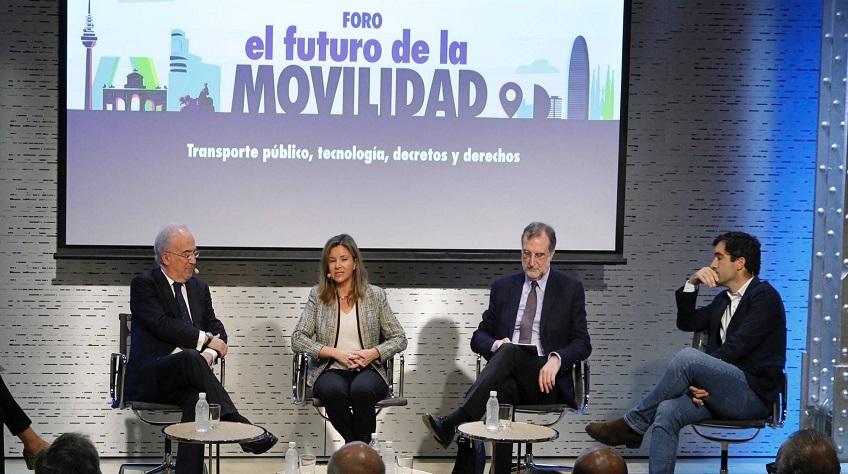News
Cinco Días Forum debates the future of transport
15-10-2018

Taxis and car rental services with driver (known as VTC) have clashed in recent months over Spanish transport regulations – with the recent bill, or royal decree law, that empowers regional authorities to legislate on ride-hailing services like Uber and Cabify within four years further fueling controversy in the sector. Today, for the first time since the approval of the decree, all main players involved have come together to hammer out the issues at the forum "The future of transport”, organized this morning by newspaper Cinco Días in Madrid.
"It is a topic of great importance and relevance – cities are changing and there are new means of transport. And the transport we want to see is now up for debate," explained Miguel Jiménez, editor-in-chief of Cinco Días, as he opened the event.
On September 28, in a bid to satisfy the demands of both the taxi and the VTC sectors, the Ministry of Infrastructure, Transport and Development presented a royal decree law, approved by the cabinet, which sees the 11,200 licenses for rental vehicles with driver currently in Spain being validated for interurban journeys. Municipal and autonomous community governments will eventually be empowered to regulate such licenses in their regions..
"Taxis have always been strictly regulated by local and regional governments. Previously, VTC had a secondary role in urban transport, but the massive influx of new licenses has given them a key role, albeit with greater regulation. Since they now offer a similar service, we wanted them to come under similar regulations and we wanted towns and cities to be able to decide which transit model they prefer, " explained María José Rallo, general secretary of transport at the Ministry of Infrastructure, Transport and Development, during the first round-table debat at the forum, entitled "Implications of regulation".
The cabinet-approved royal decree has not been without controversy, with many in the sector questioning its validity. "It will generate conflicts, because it will certainly be challenged. A decree law has limitations. It can not regulate the transfer of powers to the autonomous communities. For that, it would have to be a law passed by congress. A four-year moratorium is not a fair compensation,” said Professor of Administrative Law, Santiago Muñoz Machado.
Urban transit, where new electric transport is beginning to make significant inroads, has also been surrounded by a debate on health and the reduction of polluting emissions. "We are designing a new urban landscape. There is an boom in new means of transport that will change our cities. Private cars pollute the most. Transit affects people’s health, and there should be statewide urban transit legislation, just as there should be equal health for all,” said the award-winning architect José María Ezquiaga.
Meanwhile, businessman Iñaki Arrola, founder of Coches.com and investor in Cabify, demanded greater regulatory liberalization to accommodate entrepreneurship. "This regulation has implications for innovation. There must be less regulation. We need a country with people like Amancio Ortega or Juan de Antonio (CEO of Cabify), people who think in the long term so that entrepreneurs become models that young people want to emulate,” said Arrola.
The coexistence of urban transit models
The biggest complaint from VTC operators revolved around the economic implications for both employers and workers and possible job losses. "The laws are antiquated and unsuited to the changes and the technological disruptions that are taking place. The taxi sector is an oligopoly that acts like a cartel. The problem is that the State favors this oligopoly. The image we’re giving is that we are an old country that does not want to accept transformations. This regulation flies in the face of the new economy,” said the professor of applied economics, José María O'Kean.
Holding a very different opinion was Emilio Domínguez, lawyer of the Fedetaxi association, who said he was unhappy with what he considered to be an attack on taxi drivers. "The scapegoat in all this is the taxi driver: the State is rewarding those who are only now entering the market, not those who were already in. We’re more than willing to compete, but on an equal footing," the lawyer said.
In a bid to reduce the tension between both sectors, the debate then turned to the labor conflicts affecting employees. "We have to regulate. We’ve found a problem in our cities and now we have to promote trade unionism to improve the conditions of the workers. I also champion taxi drivers and we want to reconcile our interests. What we can’t do is pass the hot potato to regional governments," said Miguel Angel Cilleros, general secretary of the Services, Transport and Consumption at the union UGT.
Likewise Mariano Silveyra, regional manager in Europe of Cabify, called for collaboration. "The ideal is to respect technology, growth and generate sustainable development. The outlook is not optimistic. This royal decree has actually created a problem where there was none. It’s a mistake to talk about war between the taxi sector and VTCs. Outside of Spain, half of all the services we offer is through the taxi sector, so we can understand each other,” he said.
Taxis, VTCs, rental vehicles and electric scooters are revolutionizing urban transport in cities – and administrations are being forced to regulate their use. As tensions continue to flare up, the varying experts and agents involved are jostling for space to stake out their claim to the future of transport..
It may interest you



